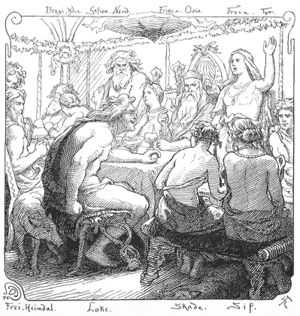لوكي
في الأساطير النوردية، لوكي Loki (/ˈloʊki/)، لوپتر Loptr، أو هڤدرونگر Hveðrungr هو كيان الشغب والمشاكسة والأذى. ابن العملاقين فاربوتي ولوفي، وأخ بالتبني للإله أودن. يوصف بأنه مبتكر كل أنواع الإحتيال. خالط الآلهة بحرية، حتى أنه أصبح أخاً لأودن بالدم، وبالرغم من البحوث، فإن شخصية لوكي تبقى مبهمة، حيث لا يوجد ما يدل على طائفة كانت تتبعه. وفي بنود الأسطورة فإن لوكي ليس إلهاً، ولا يوجد له أتباع، فهو إذن شخصية ميثولوجية، أكثر من كونه إلهاً. ويدعم هذا حقيقة أنه ليس من معسكر فانير ولا من بين آلهة الآسر وهما المعسكران اللذان ضما الآلهة الإسكندنافية. وتضعه مصادر أخرى ضمن معسكر الآسر، بسبب علاقته الطيبة بأودن، وإقامته بين آلهة الآسر معظم الوقت.
شواهد

لوكاسـِنا


وصول ثور واستعباد لوكي؛

پريمسكڤيوا


هيندلولجوو

قصيدة الرون النرويجية
ذُكر لوكي في 13 ستانزا من قصائد الرون النرويجية في ارتباط مع Younger Futhark Bjarkan rune:
- النوردية القديمة:
- Bjarkan er laufgrønster líma;
- Loki bar flærða tíma.[1]
According to Bruce Dickins, the reference to "Loki's deceit" in the poem "is doubtless to Loki's responsibility for Balder's death."[2]
السجل الأثري
حجر سناپتون

حجر كيركبي ستفن وصليب گوسفورث

Detail from the Gosforth Cross
الهوامش
المصادر
- Arvidsson, Stefan (2006). Aryan Idols: Indo-European Mythology as Ideology and Science. University of Chicago Press.
- Bellows, Henry Adams (1936). The Poetic Edda: Translated from the Icelandic with an Introduction and Notes. Princeton University Press. American Scandinavian Foundation.
- Calverley, William Slater (1899). Notes on the Early Sculptured Cross: Shrines in Monuments in the Present Diocese of Carlisle. T. Wilson.
- Dickins, Bruce (1915). Runic and Heroic Poems of the Old Teutonic Peoples. Cambridge University Press.
- Faulkes, Anthony (Trans.) (1995). Edda. Everyman. ISBN 0-460-87616-3
- Larrington, Carolyne (Trans.) (1999). The Poetic Edda. Oxford World's Classics. ISBN 0-19-283946-2
- Lindow, John (2001). Norse Mythology: A Guide to the Gods, Heroes, Rituals, and Beliefs. Oxford University Press. ISBN 0-19-515382-0
- Madsen, Hans Jørgen (1990). "The God Loki from Snaptun" as collected in Oldtidens Ansigt: Faces of the Past. Det kongelige Nordiske Oldskriftselskab. ISBN 87-7468-274-1
- Hirschfeld, Max (1889). Untersuchungen zur Lokasenna, Acta Germanica 1.1, Berlin: Mayer & Müller. (بالألمانية)
- Olrik, Axel (1909) translated by Eli, Anker. "Loki in Younger Tradition" as published in Særtryk af Danske Studier.
- Orchard, Andy (1997). Dictionary of Norse Myth and Legend. Cassell. ISBN 0-304-34520-2
- Von Schnurbein, Stefanie (2000). "The Function of Loki in Snorri Sturluson's "Edda"" as published in History of Religions, vol. 40, no. 2 (Nov., 2000), pp. 109–124. University of Chicago Press.
- Simek, Rudolf (2007) translated by Angela Hall. Dictionary of Northern Mythology. D.S. Brewer. ISBN 0-85991-513-1
- Thorpe, Benjamin (Trans.) (1907). The Elder Edda of Saemund Sigfusson. Norrœna Society.
- Turville-Petre, E. O. G. (1964). Myth and Religion of the North: The Religion of Ancient Scandinavia. Holt, Rinehart and Winston.
وصلات خارجية
 Media related to لوكي at Wikimedia Commons
Media related to لوكي at Wikimedia Commons






